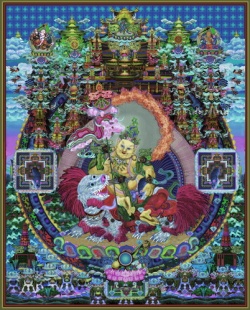Samanya
Samanya or Generality:
Generality is that category by virtue of which various different individual beings are enumerated in one class and called by a common name.
Just as all beings are called by a word or term indicating class S the examples of which are man, horse, cow etc. These have some general or common quality which is to be found in the entire class and is its characteristic. Objects or individuals possess similarity because of the general quality.
In the consideration of the general quality, Indian philosophers have subscribed to one of the following three opinions:
Three Different Opinions Concerning Generality:
(1) Nominalism:
According to this school of thought generality is no essential quality but merely a name which gives similarity to the beings belonging to its class and distinguishes it from other classes only by virtue of this name. The general has no individual or separate existence.
Among the Indian philosophies it is the Buddhist philosophy which has accepted this view.
(2) Conceptualism:
The second view concerning generality is conceptualism. According to this view, the general quality has no existence apart from the individuals and neither does it come from outside and enter into the individual.
The individual and the general cannot be separated from each other. It is the essential quality or the eternal form of general individuals which is apprehended by our mind or intellect. This point is to be found in the Jaina and Advaita Vedanta system of Indian philosophy.
(3) Realism:
The third view of generality is realism According to it the general is neither a mental thought or concept nor merely a name but has its own individual existence. The generals are eternal categories which, although separate from the individual, still pervade them.
In this way, the general is included or mixed in individuals. It is only because of the general that there is any similarity between different individuals. It subsists m substance, quality and action. It is because of general that they are called by the same name or are ^aid to belong to the same class. This view is propounded by the Nyaya-vaisesika among the systems of Indian philosophy.
Distinctions of Generality:
From the point of view of pervasion generality is of three kinds - para, apara and parapara. 'Para' is the most comprehensive, such as existence. 'Apara' is the name given to the least comprehensive such as potness. The third distinction, 'parapara' is between para and apara, an example of it being fluidity. With relation to existence it is apara, and with relation to potness it is para.
Source
sāmānya mf(ā)n. equal, alike, similar MBh. Śak
• shared by others, joint, common to (instr with and without saha, or comp.) Yājñ. MBh. Suśr. &c
• whole, entire, universal, general, generic, not specific (opp. to vaiśeṣika) Suśr. VarBṛS
• common, common-place, vulgar, ordinary, insignificant, low MBh. Kāv. &c
• (am), n. equality, similarity, identity MBh. Suśr. &c
• equilibrium, normal state or condition Nīlak
• universality, totality, generality, general or fundamental notion, common or generic property (ibc., instr., or abl., 'in general', as opp. to viśeṣa-tas, 'in particular') Kaṇ. Jaim. Sarvad
• public affairs or business W
• (in rhet.) the connection of different objects by common properties Kpr. Kuval
• (ā), f. a common female, prostitute L
• (am), ind. after the same manner as, like (comp.) Kālid
• jointly, in general, in common Mn. vii, 56
</poem>

